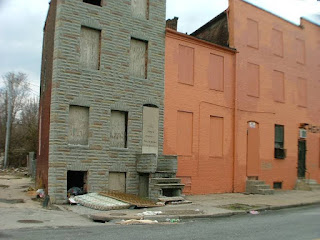The Wire came to an end here a couple of weeks ago. If you’re not familiar with the HBO show, here’s a brief synopsis: A group of detectives in Baltimore plays a game of cat and mouse with an elaborate network of drug dealers. I first became aware of the show when its creator was a guest on Bill Moyers’ show, back in the gilded age of Friday night television. I was intrigued from that point on. The show’s creator is a former Baltimore Sun reporter. I was immediately drawn to the jaded, cynical way he spoke. Months later, a friend of mine asked me if I’d be interested in getting together with a group of her friends every third Sunday night for a potluck and to watch episodes of The Wire. Yes, I said, and we did, but it didn’t exactly take: you cannot visit during The Wire. In fact, as I learned over the month or so that it took me to watch the entire series on my own, I could not do anything when watching The Wire except watch The Wire. It requires absolute focus.
I loved it, more or less. I think the main factor in the show’s addictive quality is the writing, which is excellent, but not self-consciously so. It didn’t seduce me directly: it was sneakier than that. I also think the story itself is compelling. Poverty, politics, organized and disorganized crime, hard luck on the streets, sex, the public schools, absentee parents – it’s all there, and then some.
I do, of course, have a few criticisms. The first, and biggest, is that there is way too much muttering. The entire storyline would twist and turn on one line of dialogue, and it wasn’t uncommon for me to have to replay it three times to get an idea of what had been said. I told a friend of mine about this issue, and she told me she has the exact same problem with all of Robert Altman’s movies. The second is that there were too many subplots for five seasons. I thought it was a bad move to not introduce the newspaper angle until the final season. I also would have liked to have seen more of the dock workers. The third is the ending. A detective gets fired, a major player in the drug economy gets out of jail, a couple of people get murdered and that’s kind of it. Maybe it was a commentary on the inevitability of it all, but it came across as hurried, as if the budget had run out and the actors had found other jobs.
Among people who have watched The Wire, the question of favorite characters usually comes up, so here’s my list, starting with the ones I did not like. Kima, I thought, could have been erased outright and not much would have been missing except the opportunity to type the word “motherfucker” into a script, which I’m sure is a thrill for the writers. McNulty was necessary, I suppose, but utterly unsurprising, I thought. Two characters struck something in me that I would have never expected. When Stringer was killed I actually cheered, and when the same happened to Bodie I shed a few tears – me, the same person who enthusiastically ridicules people who get emotionally involved with the television. It was a turning point of sorts. Felicia, in all of her horribleness, was weirdly intriguing, and even though the scenes with her in them required more rewinding and replaying than the others, I looked forward to them. I read the actress’ bio on the show’s shockingly bad website and learned that she arrived on the set straight off the streets. I loved Prop Joe from the moment he appeared at the basketball tournament to that fateful night he tried to leave Baltimore. I think the most artistically acted character was Omar but, believe it or not, I didn’t like the fact that he was gay. It came across as gratuitous. I could almost hear the discussion in the writing meeting: Let’s make Omar the meanest, most feared son of a bitch in Baltimore. But, to add some depth of character, let’s make him fierce about adhering to the code … and let’s make him gay!
My favorite character, by far, was Bubbles. He seemed to answer to multiple agendas in a believable, authentic way. If I had been on the writing team for The Wire, I would have made Bubbles gay rather than Omar. To me, it would have seemed like a more natural extension of his character, much more so than Omar, or Kima for that matter (oh no, did I forget to mention that she’s a lesbian? That’s because it’s forgettable). Wasn’t that scene in the basement when Bubbles is getting ready to tell the reporter his life story delicious? I kept waiting for something to happen, and waiting, and waiting.
What I didn’t wait for was the opportunity to put some more crime into the DVD player after The Wire’s vaguely disappointing ending. I watched, in horror, Crips and Bloods: Made in America and American Drug War: The Last White Hope, each of which I recommend highly.
skip to main |
skip to sidebar

Fondly recalling the days before technology & marketing ruined everything.
About Me

- Rotary
- Portland, Oregon, United States
- I'm in my mid 40s and long for the era when the main mode of communication was the rotary telephone. As I recall, people knew how to spell without spell check, they answered their phones unless they weren't home and twittering was something birds did on cartoons. All ironies aside, I really miss those days.

